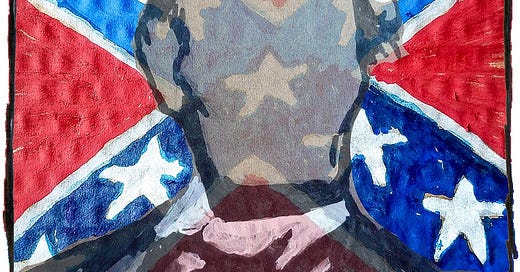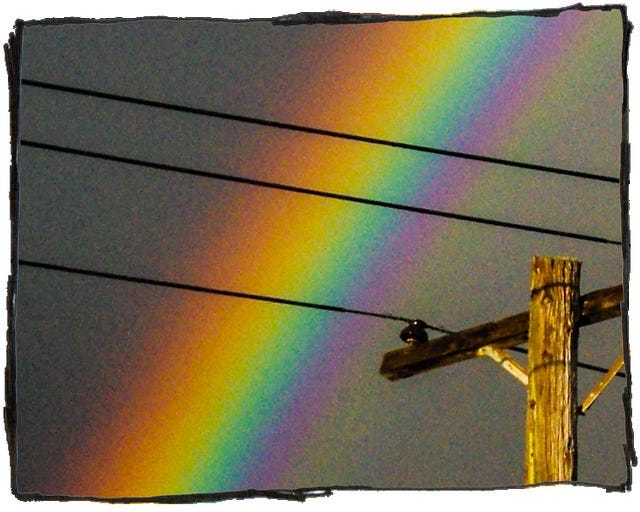We Deserve an America That Understands Confederate Tributes Are Monuments to Evil
We can no longer afford to be passive in the presence of malicious symbols
Hello Friends!
I saw a recent news report that suggested 60% of Americans think it’s acceptable to preserve Confederate statues. Immediately I wanted to ask some follow-up questions. How many of the people who responded feel that racism is acceptable? How many feel that human slavery is acceptable?
As I observe the perspectives of my fellow Americans, it saddens me to think that I truly don’t know if their beliefs are rooted in ignorance or in a despicable need to inflict pain on their fellow human beings.
Few Americans even know that the majority of the Confederate statues that currently disgrace our countryside were erected 40 years after the Civil War. When people say, “It’s about tradition,” they’re not being truthful. We have Confederate statues because the KKK came to power and wanted a means of normalizing their ideology of white supremacy.
Putting up statues of Confederate generals makes about as much sense as putting up statues of Walter Mondale, the Democratic candidate for President who lost to Ronald Reagan in 1984. It’s been 40 years, and many people have forgotten that Mondale argued that we need to do something about healthcare costs.
But let’s face it, there is no nostalgia for a forgotten politician from 40 years ago today. There was also no nostalgia for the Confederacy in the 1900s. The problem is that these statues have been rusting out in public view for over a hundred years, and many of our public schools are prohibited by law from teaching the truth.
The enduring power of a symbol
Imagine if you took a moment to draw a rainbow in chalk on the sidewalk. I see children doing this all the time and it always lightens my heart.
A rainbow is a symbol of tolerance and diversity. It’s a positive symbol that expresses a message of inclusion. Imagine if we lived in a society that erected statues to honor rainbows instead of murderous traitors willing to kill to preserve their ability to own human beings as property.
I’d prefer to live in the country with the rainbows.
Unfortunately, in the modern United States of America, rainbows are more likely to be excluded from public places than statues of slave owners.
The reality of our society is that preschool teachers have to think twice about having their students paint a rainbow. The enduring power of symbols is well-known even if it’s not overtly mentioned. Whether we’re consciously aware of it or not, we abide by the unwritten rules that determine what symbols are “acceptable” and what symbols are not.
When we fail to have honest discussions about the true meaning behind traditional symbols, a majority of the population ends up passively enabling destructive ideologies.
What I learned from working as a journalist
For about a year I worked with a digital platform that allowed me to target specific cities in the United States. Every day I’d wake up and write two simple articles about how slavery was the root cause of the Civil War. Then, I’d target these articles to major metropolitan areas in Confederate states.
Often, I’d receive 500 to 1,000 comments in the course of a few hours. It was rare to get a comment from somebody who agreed with me. Most of the comments urged me to “read a history book,” even though I included links to the original letters of secession that mention slavery as the root cause in the first paragraph.
The sad reality is that most Americans have been indoctrinated with the “Lost Cause” narrative. This is the origin of the absurd argument that the Civil War was in response to state’s rights and government overreach. The “Lost Cause” paints the picture of the Confederacy as “Noble Rebels” rather than traitors who defended the most deplorable institution in human history.
The “Lost Cause” narrative is completely untrue, and it has led to a bizarre juxtaposition of contradictory beliefs. For example, most Americans agree that Lincoln was our greatest president. Yet, they’ll also defend the right of Americans to fly the Confederate flag — the flag of Lincoln’s assassin.
In a country where everyone’s social media feed is constantly overrun by what amounts to an unhealthy form of extreme patriotism, why are people allowed to celebrate the ideology that succeeded in murdering our most revered statesman?
The task before us
As far as I’m concerned, it wouldn’t matter if 99% of Americans thought it was acceptable to keep Confederate statues on display. They’d still be wrong.
Polls that suggest there’s an indifference to Confederate monuments illustrate the degree of ignorance in our country. We can’t look at that poll and think to ourselves, “Well, majority rules.” We have to look at it and say, “We’ve failed!”
We need to live in a society where nobody can look at a Confederate flag or a statue of Robert E. Lee and not feel a sense of fundamental revulsion. These are the symbols that need to be banned from classrooms, not symbols of tolerance and unity.
We certainly shouldn’t sit passively and allow our students to be told lies at school.
Why is it so difficult to speak the truth?
There is a certain unearned reverence that’s reserved for the concept of tradition. The simple fact that something has endured for a hundred years or more doesn’t mean that it is good. The institution of human slavery is a powerful example. Prior to the Civil War, anti-abolitionists argued that they were supported by tradition, and they even went so far as to retrofit passages from the Bible to justify their beliefs.
They were wrong.
Some ideologies are so repugnant that they do not deserve consideration. The concept of human enslavement is one.
Perhaps it’s wrong to passively assume that the majority of Americans disapprove of human enslavement. This represents the danger of our failure to responsibly teach the lessons of the past. We have a historical record of the atrocities that ensue when evil men are allowed to behave without restrictions.
However, there’s also a tradition in the United States of diluting that factual history and replacing it with a false mythology designed to preserve a white supremacist ideology. Erecting statues to the Confederacy was one part, normalizing the Confederate flag was another, and allowing Confederate soldiers to be buried at Arlington was one more.
Taken individually, these seem like small concessions. However, taken together and multiplied with the power of time, the result is that these actions conspire to erode the sense of decency at our nation’s core. Symbols are used to normalize human enslavement and the general public is conditioned not to speak out, even as positive symbols like rainbow flags are removed from our classrooms.
We need to remove all tributes to slave owners
We have many traditions in place that allow for the lingering survival of anti-humanitarian beliefs. It’s wrong to teach an inaccurate or selective history of the crimes of our country. It’s wrong to build the leaders of our past up to reverential status rather than take the time to recognize their moral failures.
The problem is that the atrocities of our past create a constant impediment to our ability to prosper. It’s like driving with the parking brake on. All we have to do is train ourselves to seek flaws in the places we’ve been indoctrinated to revere as perfect.
We are adults. We’re told that we’re free. That means that we have the autonomy to choose a better future for ourselves and our children.
We’ve tried an America that allowed human beings to own each other. We’ve tried an America that revered representations of slave owners for 150 years after slavery was abolished. Where’s the harm in trying an America where we fill every classroom with rainbows?
If you’re at all dissatisfied with the direction of your life, or the direction our country is headed, perhaps consider giving diversity, equity, and inclusion a try. Everything else has failed, and that’s the one philosophy we’ve never truly embraced.
“I'd rather Be Writing” exists because of your generous support. If you have the means please consider upgrading to a paid sponsorship. I have payment tiers starting at as little as twenty dollars a year. I'm so happy you're here, and I'm looking forward to sharing more thoughts with you tomorrow.
My CoSchedule referral link
Here’s my referral link to my preferred headline analyzer tool. If you sign up through this, it’s another way to support this newsletter (thank you).







Exactly right!
Well said…I agree totally